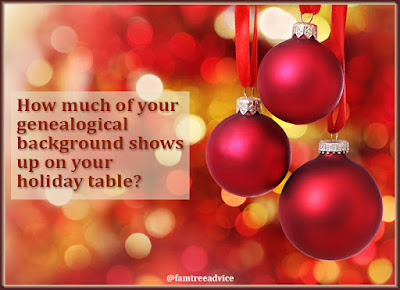Your ethnic heritage has specific tastes and textures. Are they on your table?
Something flashed across my computer screen yesterday that I didn't know. It said the pumpkin is native to North America. That makes pumpkin pie an appropriate dish for American and Canadian Thanksgiving.
The first Thanksgiving featured the food they could harvest at that time and in that place. That included squash, corn, berries, and animals including turkeys, pigs, and deer. And there were some foods you won't see on a North American Thanksgiving table, like lobsters and eel!
Aside from these foods, do you celebrate with food from your cultural past? I know the pilgrims didn't eat lasagna or eggplant parmigiana. But I can't imagine a Thanksgiving or Christmas without them.
 |
| You've learned so much about your family's background. Why not show that background on the dinner table? |
Time goes by, and many of us are a few more generations removed the from homeland. Food becomes the most visible part of our cultural identity. For example, people often ask my husband if he can speak Japanese. But the only words he knows are food names.
Other than calling a dish towel a mappina, and knowing a few colorful curse words, my sons' strongest connection to their Italian heritage is the food. I regret not having passed on more Italian culture to my half-Italian boys. But I know why it happened. During their early childhood we didn't live near any of my family. We spent the holidays with their father's side of the family. The food was always traditionally American. There was turkey, ham, corn, potatoes, cranberries, apple pie, and pumpkin pie. The only thing I can remember that had roots in their cultural background was English toffee.
When my kids were 9 and 12 years old, I finally brought them to an amazing feast at my cousin's house. At last, there were the Italian dishes I'd been missing for so long. Skip forward several years to when my parents lived near me. My mom made lasagna, eggplant, or both for every single holiday meal. And pasta with meatballs and sausage. And Italian cookies. And we had espresso with a shot of Anisette after the meal.
 |
| As a child I didn't know that Strega is a product of my ancestors' province of Benevento. |
That all felt so right to me. And isn't this a perfect way to begin talking about genealogy with your family?
There's still time for you to bring back some of your cultural traditions this holiday season. Your family may have assimilated so much that past culture is nearly gone. Bring it back and celebrate it this season.
Do you have a few childhood favorites in mind? If not, Google "traditional holiday meals from _____". Fill in the blank with the country (or countries) of your ancestors.
As genealogists, we should and do honor our past. Don't forget to bring the best parts of that past into our lives today.
I'm half Polish and have English. We celebrate Wigilia on the 24th, a meatless meal that consists of 13 dishes. However, we no longer make all 13 - my babcia used to - I remember big family Wigiila celebrations in the 70s when we really did start with the first star (around 4pm) and keep going til midnight. We now have smoked salmon on rye bread, borscht, pickled herring rolls, mushroom pastries, a hot fish dish, and, finally - nuts and chocolate. Oh, and there was (and still is) vodka ;) (NEVER Russian vodka)
ReplyDeleteThen, on Christmas Day, we celebrated a traditional English Christmas with Christmas Crackers (we all had to wear our paper crowns), chicken or turkey, roasted potatoes and other veg, followed by a Christmas pudding, doused in brandy and set on fire as it's brought into the darkened dining room. It was served with custard. We pretty much follow this, though my husband also makes hard sauce (aka rum butter) to go with his pud.
Wonderful! I'm glad to know other ethnic groups do this too.
Delete